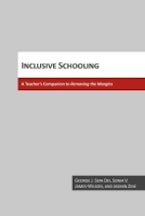
Inclusive Schooling
A Teacher's Companion to Removing the Margins
Published by: Canadian Scholars
Imprint: Canadian Scholars
71 Pages, 152.00 × 229.00 mm

Published by: Canadian Scholars
Imprint: Canadian Scholars
71 Pages, 152.00 × 229.00 mm